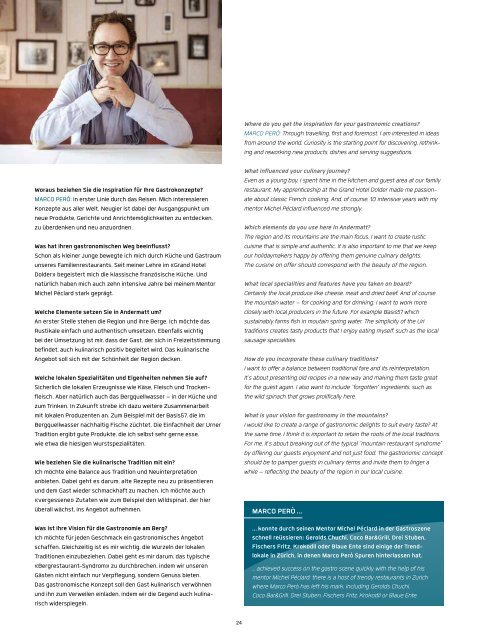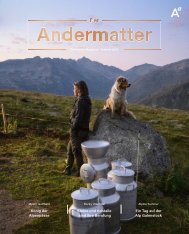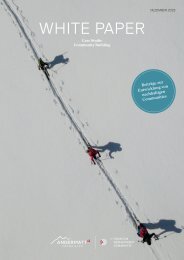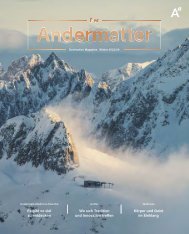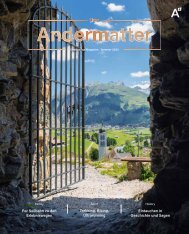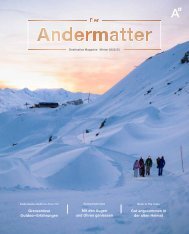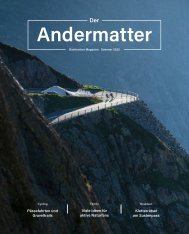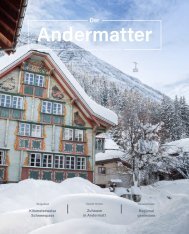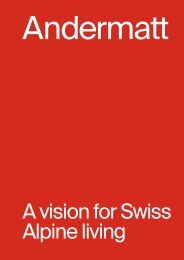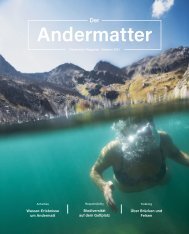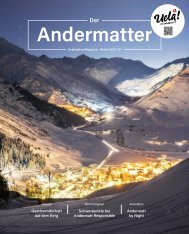Erfolgreiche ePaper selbst erstellen
Machen Sie aus Ihren PDF Publikationen ein blätterbares Flipbook mit unserer einzigartigen Google optimierten e-Paper Software.
Where do you get the inspiration for your gastronomic creations?<br />
MARCO PERÒ: Through travelling, first and foremost. I am interested in ideas<br />
from around the world. Curiosity is the starting point for discovering, rethinking<br />
and reworking new products, dishes and serving suggestions.<br />
Woraus beziehen Sie die Inspiration für Ihre Gastrokonzepte?<br />
MARCO PERÒ: In erster Linie durch das Reisen. Mich interessieren<br />
Konzepte aus aller Welt. Neugier ist dabei der Ausgangspunkt um<br />
neue Produkte, Gerichte und Anrichtemöglichkeiten zu entdecken,<br />
zu überdenken und neu anzuordnen.<br />
Was hat Ihren gastronomischen Weg beeinflusst?<br />
Schon als kleiner Junge bewegte ich mich durch Küche und Gastraum<br />
unseres Familienrestaurants. Seit meiner Lehre im «Grand Hotel<br />
Dolder» begeistert mich die klassische französische Küche. Und<br />
natürlich haben mich auch zehn intensive Jahre bei meinem Mentor<br />
Michel Péclard stark geprägt.<br />
Welche Elemente setzen Sie in Andermatt um?<br />
An erster Stelle stehen die Region und ihre Berge. Ich möchte das<br />
Rustikale einfach und authentisch umsetzen. Ebenfalls wichtig<br />
bei der Umsetzung ist mir, dass der Gast, der sich in Freizeitstimmung<br />
befindet, auch kulinarisch positiv begleitet wird. Das kulinarische<br />
Angebot soll sich mit der Schönheit der Region decken.<br />
Welche lokalen Spezialitäten und Eigenheiten nehmen Sie auf?<br />
Sicherlich die lokalen Erzeugnisse wie Käse, Fleisch und Trockenfleisch.<br />
Aber natürlich auch das Bergquellwasser – in der Küche und<br />
zum Trinken. In Zukunft strebe ich dazu weitere Zusammenarbeit<br />
mit lokalen Produzenten an. Zum Beispiel mit der Basis57, die im<br />
Bergquellwasser nachhaltig Fische züchtet. Die Einfachheit der Urner<br />
Tradition ergibt gute Produkte, die ich selbst sehr gerne esse,<br />
wie etwa die hiesigen Wurstspezialitäten.<br />
Wie beziehen Sie die kulinarische Tradition mit ein?<br />
Ich möchte eine Balance aus Tradition und Neuinterpretation<br />
anbieten. Dabei geht es darum, alte Rezepte neu zu präsentieren<br />
und dem Gast wieder schmackhaft zu machen. Ich möchte auch<br />
«vergessene» Zutaten wie zum Beispiel den Wildspinat, der hier<br />
überall wächst, ins Angebot aufnehmen.<br />
Was ist Ihre Vision für die Gastronomie am Berg?<br />
Ich möchte für jeden Geschmack ein gastronomisches Angebot<br />
schaffen. Gleichzeitig ist es mir wichtig, die Wurzeln der lokalen<br />
Traditionen einzubeziehen. Dabei geht es mir darum, das typische<br />
«Bergrestaurant-Syndrom» zu durchbrechen, indem wir unseren<br />
Gästen nicht einfach nur Verpflegung, sondern Genuss bieten.<br />
Das gastronomische Konzept soll den Gast kulinarisch verwöhnen<br />
und ihn zum Verweilen einladen, indem wir die Gegend auch kulinarisch<br />
widerspiegeln.<br />
What influenced your culinary journey?<br />
Even as a young boy, I spent time in the kitchen and guest area at our family<br />
restaurant. My apprenticeship at the Grand Hotel Dolder made me passionate<br />
about classic French cooking. And, of course, 10 intensive years with my<br />
mentor Michel Péclard influenced me strongly.<br />
Which elements do you use here in Andermatt?<br />
The region and its mountains are the main focus. I want to create rustic<br />
cuisine that is simple and authentic. It is also important to me that we keep<br />
our holidaymakers happy by offering them genuine culinary delights.<br />
The cuisine on offer should correspond with the beauty of the region.<br />
What local specialities and features have you taken on board?<br />
Certainly the local produce like cheese, meat and dried beef. And of course<br />
the mountain water – for cooking and for drinking. I want to work more<br />
closely with local producers in the future. For example Basis57 which<br />
sustainably farms fish in moutain spring water. The simplicity of the Uri<br />
traditions creates tasty products that I enjoy eating myself, such as the local<br />
sausage specialities.<br />
How do you incorporate these culinary traditions?<br />
I want to offer a balance between traditional fare and its reinterpretation.<br />
It’s about presenting old recipes in a new way and making them taste great<br />
for the guest again. I also want to include “forgotten” ingredients, such as<br />
the wild spinach that grows prolifically here.<br />
What is your vision for gastronomy in the mountains?<br />
I would like to create a range of gastronomic delights to suit every taste? At<br />
the same time, I think it is important to retain the roots of the local traditions.<br />
For me, it’s about breaking out of the typical “mountain restaurant syndrome”<br />
by offering our guests enjoyment and not just food. The gastronomic concept<br />
should be to pamper guests in culinary terms and invite them to linger a<br />
while – reflecting the beauty of the region in our local cuisine.<br />
MARCO PERÒ ...<br />
... konnte durch seinen Mentor Michel Péclard in der Gastroszene<br />
schnell reüssieren: Gerolds Chuchi, Coco Bar&Grill, Drei Stuben,<br />
Fischers Fritz, Krokodil oder Blaue Ente sind einige der Trendlokale<br />
in Zürich, in denen Marco Però Spuren hinterlassen hat.<br />
... achieved success on the gastro scene quickly with the help of his<br />
mentor Michel Péclard: there is a host of trendy restaurants in Zurich<br />
where Marco Però has left his mark, including Gerolds Chuchi,<br />
Coco Bar&Grill, Drei Stuben, Fischers Fritz, Krokodil or Blaue Ente.<br />
24


